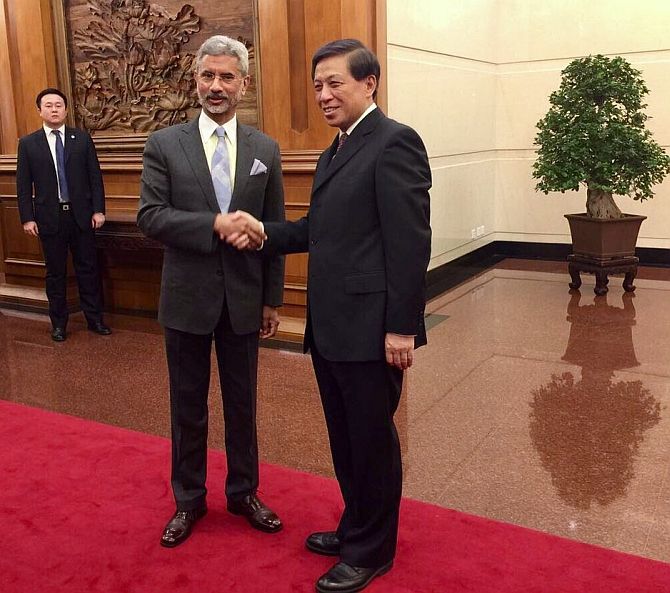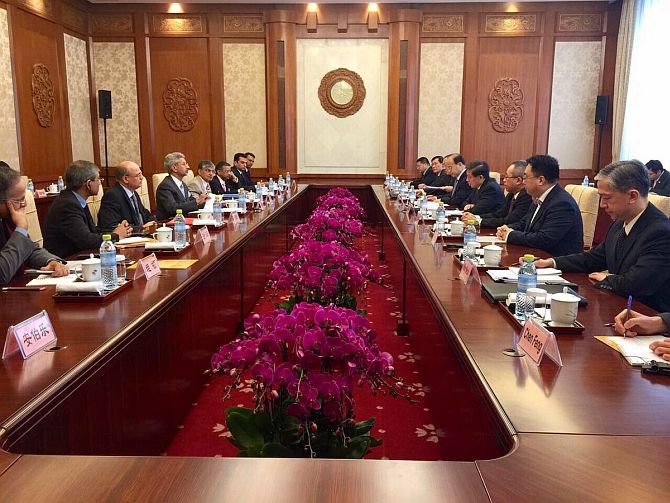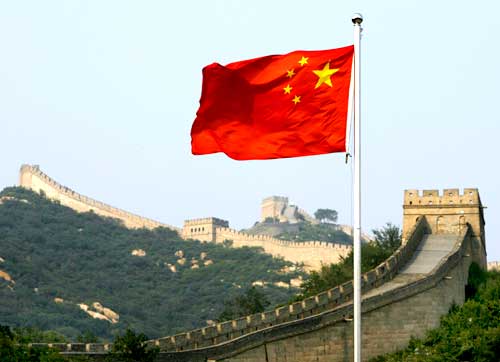China and India on Wednesday held their upgraded strategic dialogue to shore up bilateral ties amid hectic parleys to resolve differences over Beijing's reluctance to support India's bid for Nuclear Suppliers Group membership as well as a United Nations ban on JeM chief Masood Azhar.

Just before the dialogue, Foreign Secretary S Jaishankar held talks with Chinese Foreign Minister Wang Yi.
Welcoming Jaishankar, co-chair of the dialogue, Wang said China and India are two major developing countries and emerging markets besides important nations in the world.
"We have to have frequent meetings," he said, referring to high-level talks held by officials from both sides on critical issues before Wednesday's dialogue.
The official-level meetings made very good foundation for the "successful strategic dialogue", he said, adding that the Chinese side attaches importance to "this reconstituted dialogue".
"I am certain by raising the level of this strategic dialogue the two sides will be able to enhance their strategic communication, reduce misunderstanding and build more trust and deepen our strategic cooperation," Wang said.
"This way we can better tap into the potential of our bilateral relations and live up to our responsibilities" for the regional stability.
In his response, Jaishankar said, "This is the first time that the restructured strategic dialogue is taking place".
"This shows that our relationship today has gone well beyond bilateral manifestations," he said.
Stating that the two countries are members of G20, Shanghai Cooperation Organisation (SCO), BRICS and the East Asia Summit, he said this will "allow us to find more common ground on more issues".
Later, Jaishankar along with China's Executive Vice Foreign Minister Zhang Yesui held the strategic dialogue.
In his opening remarks at the dialogue, Jaishankar said, "We have truly transcended the bilateral dimension of our relations. What happens between India and China has both great global and regional significance.
"Our assessment coming in is that our bilateral relations have really acquired a very steady momentum over many years. Our leadership-level meetings have been taking place regularly and our economic engagement is growing. We are seeing cooperation on many international issues and our border areas have maintained peace and tranquility," he said.

"Overall the closer development partnership has been unfolding," he said.
Apparently referring to differences, Jaishankar said, "there are natural issues which neighbours have" and it is the responsibility of both the countries to address them.
Zhang said "I expect that we discuss the full range of issues that are important to our countries".
Several top officials from both sides, including those in-charge of nuclear disarmament issues, were present at the talks.
The talks were being held in the backdrop of vocal differences between the two countries on a host of issues including India's concern over the $46 billion China-Pakistan Economic Corridor, Beijing's reluctance to back India's application to join the NSG and the UN ban on Azhar.
The strategic dialogue was upgraded during Chinese Foreign Minister Yi's visit to New Delhi last year. China has deputed Zhang, also the head of the influential Communist Party of China committee of the Chinese Foreign Ministry to co-chair the talks.
Ahead of Wednesday's talks Jaishankar, who formerly worked as India’s Ambassador to China, met China's top diplomat Yang Jiechi on Tuesday and held talks with him on the critical issues bedevilling the bilateral ties.
Photographs: Indian Embassy in China/Twitter











 © 2025
© 2025